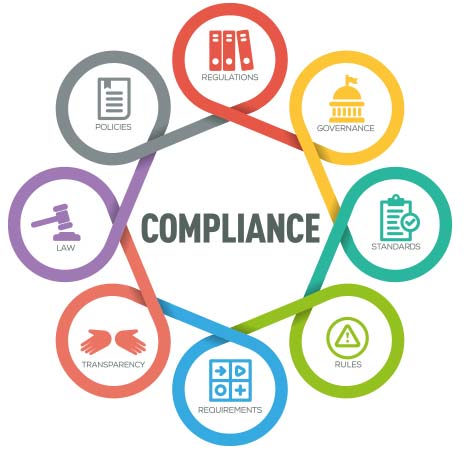Home/ Blog / FinTech Compliance Concerns – Oversight and Best Practices to Reduce Risks
FinTech has opened doors for innovative products and services in the financial sector. However, it has also brought its set of challenges and issues for firms related to the FinTech industry. While banks and financial institutions operate according to their regulations, new FinTech companies strive to work in this strictly regulated space.
Most new and/or smaller FinTech firms lack resources and information to manage risk and work under compliance requirements. They must strive hard to avoid any issues raised by regulators.

Challenges of FinTech Companies
Like banks and credit unions, FinTech companies that offer loans or deposits must follow applicable state and federal regulations. Even though each company has its set of challenges, the three most common ones include:
- FinTech has broadened the horizon to bring new products and services to the financial sector. Such an advantage has also increased the chances of the potential risk of failure as maintaining a larger pool of customers is hard to track.
- Since FinTech brings new integrations for banks and the financial sector, fresh players attract more attention from malicious third parties. Prevention of this matter requires strict adherence to compliance and implementation of the culture in FinTech companies.
- The regulatory landscape of US FinTech is complex although they fall under financial regulatory bodies. Businesses associated with FinTech need to follow obligations and register according to one or more regulatory bodies subject to state or federal levels.
Overcoming these challenges requires a robust compliance structure that should be the top priority for FinTech companies. They should also remember that every business will follow specific regulatory requirements in the coming days. Hence, it becomes necessary for FinTech companies to design their compliance program and apply well-established RegTech (regulatory Technology) features.

Key Risk Areas for FinTech Companies
The key risk areas that apply to FinTech companies include:
Reputational Risk:
Reputational risk always exists for every product or service launched by the financial institution, including FinTech. Companies put their time, effort, and resources into bringing something new to clients, and even a tiny mistake can shatter their trust. Additionally, reputational risk also affects revenue and the company’s market value.
Regulatory Risk:
The emergence of innovations and technologies has significantly disrupted the financial service sector. These changes happen fast that regulatory bodies do not have time to set guidelines and oversights. It often takes months and sometimes years to finalize new standards and approve their implementation.
FinTech partners with banks have to go through a strict monitoring process for any FinTech partners compliance issues throughout their tenure. For such partnerships, a foundation of compliance and strict following is the need of the hour.
Financial Risks:
Failure to adhere to compliance steps has a direct consequence on a company’s revenue. Besides revenue, there is a possible chance that future profit, share price, and raising additional capital may happen with a loss of client confidence and further investment.
Business Risk:
There is a potential risk of the unknown present whenever introducing something new. FinTech creates a business model aimed toward innovation while banks/financial institutions work under a narrow regulatory environment. These opposing operative forces may result in risky blind spots due to overlapping. Furthermore, unexpected economic, political, and social conditions can also trigger changes in FinTech regulations leading to further business-related risks.
Regulatory Best Practices for FinTech Industry
Some of the regulatory best practices that FinTech companies should follow:
AML Scrutiny:
Following Anti Money Laundering (AML) scrutiny rules is one of the best practices that FinTech can follow to mitigate its risks. In 2020, a penalty was levied on a digital currency operator by the Securities and Exchange Commission (SEC). It was due to a broken FinTech law by the operator and not enforcing adequate AML program regulations. Since FinTech offers financial services, it should implement an AML scrutiny program from day one.
Keeping Consumer Rights in Focus:
Many regulatory bodies have started to pay attention to consumer rights, which makes it essential for FinTech to show vigilance in this area. The Consumer Financial Protection Bureau (CFPB) is a body that regulates and investigates any consumer rights violation. Following this rule applies not only to banks or financial institutions but also to FinTech.
Know Your Customer (KYC):
Operating within the line of the KYC concept should be the top priority for any FinTech company. The financial sector has started to put much emphasis and effort on KYC to root out frauds and malicious financing that FinTech should follow as a part of FinTech Risk Management.
Planning with Compliance Program:
FinTech evolves continuously and has no drafted regulations yet. As a result, it stems from multiple areas throughout the financial sector in addition to guidelines. FinTech should also interact with regulators for updated compliance developments and ensure consumers receive innovative financial products/services like other financial institutions.

Final Point
The financial sector must follow strict compliance to ensure smooth operations and prevent malicious activities (money laundering or terrorist funding). The same regulatory rule applies to FinTech, which aims to bring financial innovations. However, the lack of drafted regulations and the introduction of continuous innovations makes FinTech a target for various dangers and challenges. KYC concept and AML scrutiny should prioritize FinTech firms to eliminate fraud. Predict360 is a compliance and risk management solution that offers updated regulations in the financial sector that FinTech can follow. We work closely with FinTech companies to streamline their compliance program so they can mitigate risks and prevent issues.
Request a Demo
Complete the form below and our business team will be in touch to schedule a product demo.
By clicking ‘SUBMIT’ you agree to our Privacy Policy.



